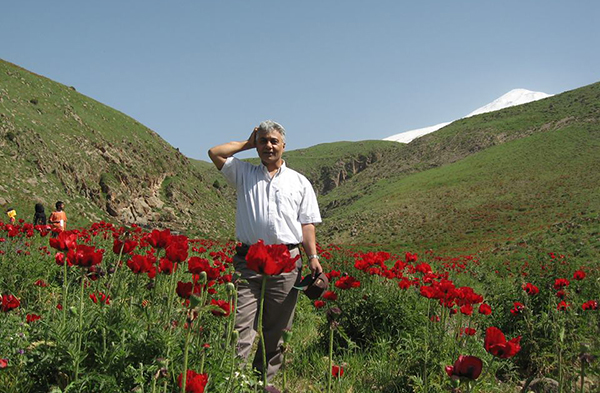The son of imprisoned Iranian journalist Issa Saharkhiz says his father’s health has deteriorated and he has lost a worrying amount of weight since being sent to Evin prison last November. In an interview with CPJ, Mehdi Saharkhiz said his father, who is due in court this week, has been treated poorly.
Saharkhiz, a prominent journalist who contributed to opposition news website Rooz Online, was arrested in an apparent pre-election crackdown by Iranian authorities on November 2, the same day as three reformist journalists–Saman Sarfarzaee, Afarin Chitsaz, and Ehsan Mazandarani. At the time of their arrests Tasnim, a news agency closely associated with Iran’s Revolutionary Guards, and the conservative Rah-e Dana news website reported that the journalists were members of an “infiltration network” with links to “hostile Western countries.”
With 19 journalists behind bars, Iran was the third worst jailer of journalists in the world in 2015, according to CPJ’s annual prison census.
On February 2, Saharkhiz was charged with “propagating against the state” and “assembly and collusion against national security,” according to his attorney Mahmoud Alizadeh Tabatabaie, who spoke to Tasnim, and the human rights group International Campaign for Human Rights in Iran. It is not the first time Saharkhiz, a former deputy minister of culture, has been imprisoned. He was jailed in Iran from 2009 to 2013 on charges of “insulting the supreme leader” and “propagating against the state,” according to CPJ research.
In a phone interview with CPJ this week, Mehdi Saharkhiz who lives in the U.S., said that his father was moved to solitary confinement before the elections on February 26, in an apparent attempt to prevent him from providing any analysis or comment. He added that his father, who is due in court March 5, has faced tough conditions in jail.
[EDITOR’S NOTE: Mehdi Saharkhiz’s responses have been translated from Persian and edited for clarity.]
CPJ: When was the last time your family was able to speak with your father and are relatives able to visit him?
My family was able to talk to him on Sunday. He told them that he had voted in the elections and he was doing somewhat better. But his phone was disconnected before he could say anything more. They have been able to visit him a few times.
Why was your father detained?
If you look at what my father had written before his arrest, especially the article “Wishful Thinkers,” [published in Rooz Online in October last year] he predicted [the Guardian Council] would disqualify many candidates. He predicted one of their main strategies for the elections, months earlier. I think this is one of the reasons my father was arrested.
Also, I think it was because my father is well known and liked by different factions. A lot of people organize [policy] based on his analysis. The authorities didn’t want him to be out to participate in pre-election events. Even after they arrested him they didn’t allow him to follow election news. He is unaware of what is happening outside. As election day neared, authorities transferred him to a solitary cell and denied him phone calls and in-person contact. I think they transferred him on Tuesday [February 23]. They didn’t want him to get any election updates so he wouldn’t be able to offer analysis.
[EDITOR’S NOTE: Attempts by CPJ to reach officials at Evin prison for comment were unsuccessful.]
There have been reports that your father is not doing well. How would you describe your father’s health before and since going to prison?
The last time my father was in prison the Medical Examiner’s Office officially stated that he should be released on medical grounds and that prison is the equivalent of a death sentence for him. My father is on kidney and blood pressure medication.
He is in a critical condition. In protest at his treatment in prison, he has gone on a number of hunger strikes and refused to take his medication. This has made his situation more dangerous. At one point, he refused to take any food, liquid or medication for six days.
He has lost 26kg (57lb) since he was detained. Loosing that much weight is even dangerous for a healthy person. He is certainly concerned about his health. He hasn’t received much medical attention … The authorities don’t seem to care.
What was your father’s main demand during these hunger strikes?
He was protesting his condition in prison. The authorities have taken away his prescription glasses, his medication, books, even his Quran. They have treated him really badly.
Your father was arrested on the same day as three other journalists in the lead up to elections. With the election over do you hope he will receive better treatment or that his case might be resolved faster?
From what I know he is supposed to go to court this week so they can play out their made up scenario that my father was part of an “infiltration network.” I hope now that the hardliners have taken an embarrassing blow in the elections, they understand where they stand with the Iranian people, especially people in Tehran, and change how they treat them.
